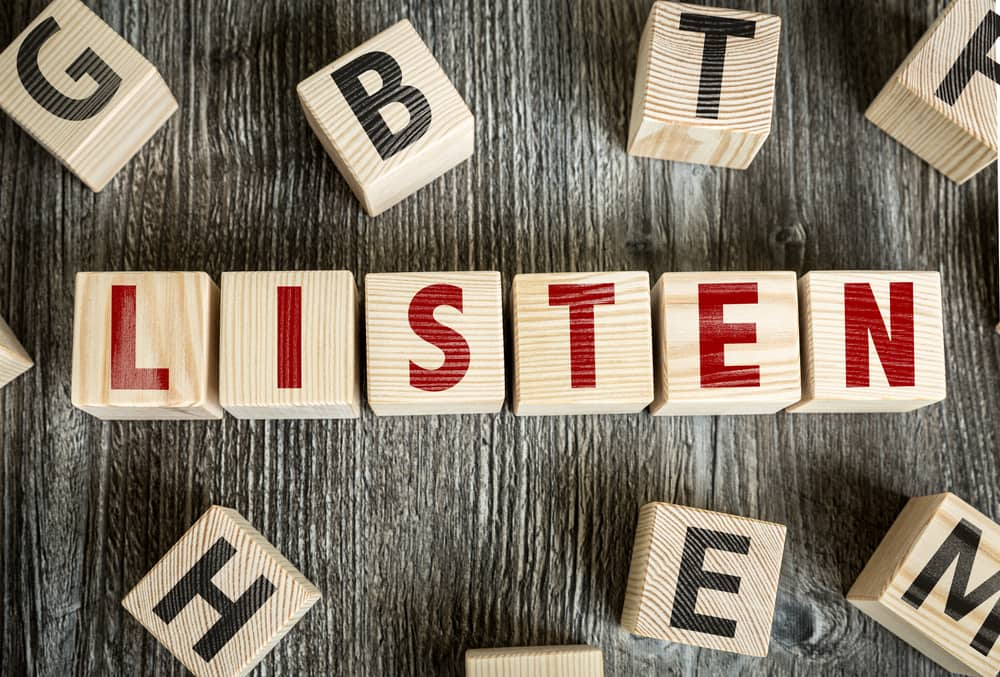Empathy in a relationship brings feelings of warmth and security knowing your partner understands and cares about your feelings. It’s a very powerful force, helping you and your partner become closer and more connected.
Active listening is similar in terms of the positive effects it offers and it’s closely related to empathy. In fact, there’s hardly one without the other. You can hardly understand how your partner’s feeling without actually listening to them.
Empathy and active listening nurture your relationship and make its foundations stronger. They foster intimacy in marriage, prevent problem avoidance, and encourage positive relations. However, what can you do if your partner is simply not there yet? And what if you’re the one who finds it difficult to feel empathy in some situations?
Why Are Empathy And Active Listening Important In A Relationship?
Empathy and active listening go hand in hand in fostering loving, caring, and happy relationships. Without it, you risk facing silence and misunderstanding in your relationship, which can slowly create a divide between you and your partner.
However, it’s important not to confuse empathy with the absolute absence of healthy disagreements. Empathy is the ability of both parties to truly listen to each other’s standpoint, recognize and acknowledge their differences, and work with them rather than against them.
Empathy allows you and your partner to truly understand each others’ feelings, thoughts, and points of view. It’s what deepens your connection and what ultimately brings you closer together.

In fact, true empathy can enrich your your relationship in multiple ways:
- It bridges the gaps: Empathetic behavior serves to improve trust and understanding between partners, which brings you closer together and makes your relationship stronger.
- It brings attention: As you learn to truly empathize with your significant other, you’ll start being able to give them the kind of attention they need, and the same goes for you.
- It nurtures the positive: Empathy is a positive feeling, and it can bring other positive emotions into your relationship.
- It introduces compassion: As you begin to see the world in another perspective, you’ll start being more compassionate with your partner, deepening your connection and having a better insight into what they’re going through.
- It fosters patience: As your relationship becomes more and more empathetic, you will find that patience will come more naturally which further nurtures positive discussions and nips potential arguments in the bud.
- It allows improvements: Finally, empathy teaches both you and your partner that not everything revolves around you, which leaves room for improving and growing as individuals and as a couple.
How Can Active Listening Improve Relationships?
Active listening is an essential relationship skill. It refers to a person’s, or in this case, partner’s ability to attentively listen and, more importantly, hear and understand what you’re trying to say.
Active listening in a relationship is more than just allowing essential information to get through to you, which is why it’s so closely related to empathy. It’s, at the same time, both listening and understanding. It’s an emotional investment into your partner and one that pays off immensely:
- It signals to your partner that you’re fully present and there for what they have to say.
- It fosters engagement and interest in your relationship.
- It allows you to receive more information about your partner, which only leads to a deeper connection.
- Active listening fosters better communication through enhanced understanding of your partner’s non-verbal cues.
- It allows you to better manage your emotions and allow your partner to take center stage.
- It improves your ability to ask relevant questions that will carry the conversation forward and foster deeper emotional engagement.
- It simply shows that you care, that you’re there, and that you want to listen to what your significant other has to say.

How Do You Deal With A Partner That Does Not Listen?
Paradoxically, the only way to deal with a partner that doesn’t listen is to try to get them to listen, and that can be tough. The trick is to try to remain calm while trying to get your voice across, while also being persistent.
Additionally, it’s important to know some of the reasons why your partner might struggle with active listening:
- They have difficulty expressing their feelings and are scared to enter a deep conversation.
- They’ve come to rely on themselves rather than the people around them, impacting their ability to actively listen.
- They’ve faced a wall on your end on a couple of occasions, getting them to slowly shut down.
- They’re afraid that a conversation might lead into an argument if they have an opposing opinion.
- They feel like you’re going to judge them.
- They just don’t know how to actively listen.
How Do I Listen To My Partner Better?
Sometimes, it’s up to you to work on your listening skills. It can be tough. Yet, knowing and understanding there’s room for improvement is an enormous first step in becoming a better active listener and partner.
The skills necessary for enhancing your active listening are:
- Being completely present in the moment, in the conversation, and in the sentiment.
- Giving appropriate non-verbal and verbal cues as your partner is talking, including nods, paraverbal connectors, and verbal assurance sounds.
- Asking open-ended questions that show that you’re listening, that you want to extend the conversation, and that you’re interested in what the other person is saying. “Tell me more…”
- Reflecting on the content and feelings your partner is trying to express and asking for feedback on your understanding of their message.
- Asking whether or not they would like to hear your opinion and allowing them to choose if they need assistance.
- Offering comfort if your partner’s looking for it.

PIVOT Workshops Help You Improve Intimacy In Your Marriage Or Relationships By Nurturing Better Listening & Empathy
From experiencing love addiction in your relationship to realizing that the passion between you and your partner might be fading, some relationship problems can be difficult to deal with. Different issues in your relationship can have a significant impact on your personality and life, and yet it seems few hit home quite as hard as not being heard.
It’s one of our basic necessities to talk and for somebody to listen, to share and for somebody to acknowledge, and to speak and for somebody to show empathy. As important it is in our day-to-day interactions, it’s miles more important when it comes to our partner. And if your partner doesn’t listen or show they care, who will? Understanding empathy and realizing how to listen takes time, patience, and practice. At PIVOT, we facilitate that process with our well-planned couple workshops and activities, as well as through our individual coaching sessions. We’re here to listen to your problems and help you and your partner truly start listening to each other. Empathy is a skill you can learn and we’ll show you how to do it. Reach out to us today and let’s listen to each other together.